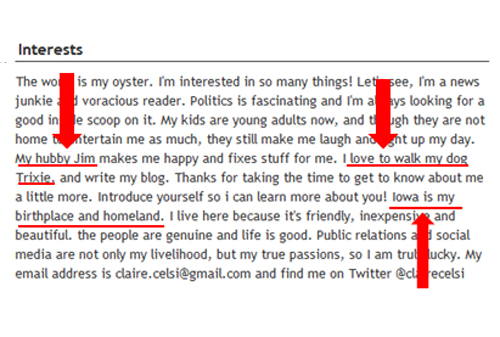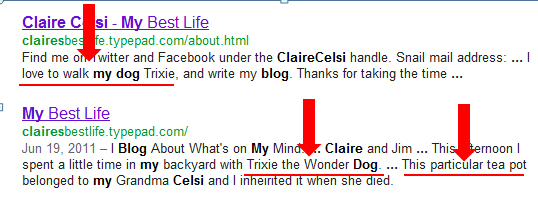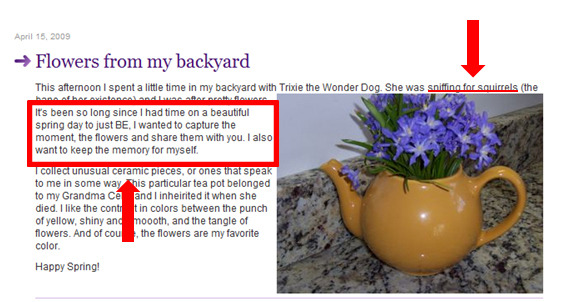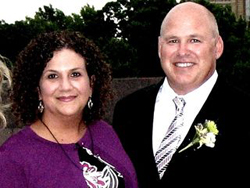Update on March 8, 2012:
For years, I have recommended—at this blog, in my articles, in my newsletters, during my webinars, during interviews with other media, in my live presentations and elsewhere—that you NOT pitch a blogger unless you spend time at their blog reading their posts. You must have a good understanding of what they write about. You must know their target audience. You must determine, before you pitch, if your topic is a good fit. If the answer is yes, then and only then, can you use the technique I’ve described below. I should have made that clear when I wrote this.
* * *
If you want to pitch bloggers or journalists, and make them snap to attention when they read your pitch, let them know you know the names of their dogs or cats, or other personal details that you might be able to weave into your pitch.
Here’s an example. Let’s say I want to pitch Claire Celsi, who writes the Publicity Relations Princess blog.
1. First, I check her “About” page and I learn that her husband’s name is Jim, her dog’s name is Trixie and she lives in Iowa, not far from Wisconsin where I live.
That sure was easy.
But what if she doesn’t have an “About” page? And what if I don’t have a lot of time to read her blog posts to find out if she even has a dog? Here’s a quick and easy way I’m able to learn not only that she has a dog, but the dog’s name, in less than 30 seconds and several more valuable details in less than 60 seconds. When you see how drop-dead simple this is, you’ll howl.
First, I set my timer to see how long this takes. Then I open my Google browser and search for [claire celsi blog] + [my dog]”. The brackets tell Google I want an exact match.
I struck gold! Here’s what Google returned to me. These are the first two listings on the page:
In less than 30 seconds, I learn:
- Claire has a dog that she affectionately refers to as “Trixie the Wonder Dog.” (The About page at her blog simply says the dog’s name is Trixie.)
- She inherited a teapot from her grandmother.
Curious about the teapot, I click on that second link and I find a blog post with a pretty photo of purple flowers inside a teapot:
More golden nuggets! I also discover:
- Trixie loves to chase squirrels.
- Claire collects ceramic pieces and loves this teapot that she inherited from her grandmother.
- On a spring day in April (the blog post includes the date), she delights in finding purple flowers in her backyard and she places them inside the teapot in her house. Why does Claire think that finding flowers in her backyard is such a big deal? Because she lives in Iowa, where it isn’t unusual to see snow in April.
Now, I’ve collected enough details.
I’ve Done My Research. It’s Time to Pitch
Because I live in the Midwest too, I know that this has been one of the warmest winters on record. Using that information, and knowing what I know from the nuggets I collected at her blog, I connect the dots.
Here’s the first paragraph:
Hi Claire:
I hope this finds you, Jim and Trixie well, and that Trixie is enjoying her walks and chasing squirrels in Iowa’s very unseasonably warm winter. It won’t be long before you can fill your teapot with spring flowers again.
(Now, I pitch my idea….)
See how easy this is?
It took me far longer to write this blog post that it did to learn all those juicy details about Claire’s life. The first paragraph of my pitch tells her: “I know who you are. I know your husband’s name. I know your dog’s name. I know your dog’s nickname. I know you live in Iowa. I know you love finding flowers in your backyard in April. I know you collect ceramic items. I know you love to put the flowers in your grandmother’s teapot.”
That’s so much more powerful than the crappy pitch someone emailed last week:
“Hi:
“I am a freelance writer who would like to write for your blog. If you have an interest in tips about romance, please let me know and I’ll write something.”
That pitch says: “I don’t know who you are. I don’t know your name because if I did I would have used it in the salutation. I’m too lazy to read your blog so I don’t know what you write about. But I’m not worried about wasting your time.”
Other Ways to Use My Tips
My tips don’t always work because not all bloggers and journalists share personal details about themselves online. But many do.
You can use my Google search tips to also find the name of their spouse or children. But be very careful about mentioning the children’s names in your pitch. Some bloggers, particularly women, might think you’re stalking their kids. If you do name the children, let the blogger know how know the names. Example:
“You’ve mentioned several times in your blog that Ashley, your 3-year-old, loves fingerpainting. You might be interested in knowing about non-toxic., kid-safe cloth wipes my company has created that remove paint from walls and carpets…”
Also, these personal details work best when you can actually tie them into the topic of your pitch, like I just did.
I got the idea for this post after I wrote an item earlier this week on How personal details in your pitch is your ticket to publicity. Blogger BL Ochman wrote about a **really great** PR pitch she received from Rob Toledo of Distilled Creative and she actually dissected the pitch to show you what caught her attention.
In the Comments section of my post, Rob mentioned that he was able to find the name of BL’s dog, but not mine. So, Rob, this post is for you, and for anybody else who wants to bowl over a blogger or journalist with a pitch.
But I can’t leave within showing you the adorable photo of Trixie the Wonder Dog:
Thanks, Claire, for sending it. And here’s a photo of Claire and hubby Jim:
Let’s hear how other Publicity Hounds research journalists and bloggers. Have you ever used interesting details in your pitch? If so, tell us about it and link to the article or blog post that you got as a result.
A Tool That Can Help You:
If you don’t have $3,000 to spend on a big, fancy media list, and if you want to create your own customized list of far fewer journalists and bloggers, and collect the kinds of details you see here, check out How to Create Your Own Database of Valuable Media Contacts. The learning tool comes with the same 8 templates I use. They will save you months of time.












Thanks for the great post, Joan! Hope you and your fellow publicity hounds get a lot of great results from these tips! Best, Claire
What a great post! Finding details about our lives these days doesn’t take much sneaking around (research) as it once did. Participating in social media has made most off our lives an open book.
Thanks for your amazing help again.
You’re welcome, Flora. What I didn’t mention in the post, and should have, was that Claire Celsi was my first choice for this little experiment because she’s in the same niche I’m in. As I said, this doesn’t always work. But it’s certainly worth a try. Let me know if you have success with it.
Hi Joan,
So what’s your dog’s name? 🙂
Karen
Karen, go ahead and follow the step-by-step process I have outlined and you will learn my dog’s name in FEWER than 30 seconds.
I’ve always been very “old school” when it comes to pitching. Research, research and more research about your target (guess they don’t teach that in the communications courses at colleges these days) – so this was a very welcome and easy tip on getting that information super quick. Thanks Joan! Good info as always.
I’ve never seen this technique taught anywhere. Hope you have success with it, Dawn.
The dog is borderline ok, since she is mentioning it herself, but if someone would pitch me with the name of my kids he had googled or any other too personal detail, I would call the FBI.
Thanks, Eva. It will be interesting to see how many others feel the same way you do.
This seems incredibly stalkerish and I can’t believe you are suggesting that people do this. I’m a blogger, and if anyone did this to me, I’d feel very uncomfortable, and would be not inclined to want to have anything to do with them. Even if I did post personal details (and I’ve always tried to be careful about what I post), this kind of concentrated collection of information seems very inappropriate. Most bloggers I know are actually very private people, and most of them would not appreciate an inappropriately personal email like this.
Sheila, thanks for another view.
Hi again. We’ve been discussing this on the Kidlit bloggers email group, and based on the conversation there I wanted to clarify my post. Researching a blog before pitching is not only a good idea, it’s mandatory. I expect that anyone pitching me has at a minimum read my blog and review policy and knows what kinds of books I review. It always surprises me how many off-topic pitches I get. It’s a waste of their time and mine. Familiarity with my blogging and professional activities is not a bad thing, either.
But this seems contrary to that: what you are suggesting doesn’t help to understand my blog, but rather to shortcut the process by finding superficial knowledge that will make it SEEM like someone is familiar with my blog. And there’s a big difference between knowing that I review YA fantasy, or am a Cybils Awards organizer, or attended Kidlitcon, and knowing the names of my pets, my children, and that I inherited a teapot from my grandmother (from your example). The former examples are professional details that are pertinent to the blogger/publicist relationship, the latter are personal details that have nothing to do with that relationship.
Sheila, I have written, spoken, urged and recommended repeatedly in the past—in articles, in my ezine, at this blog and from the platform–that before you pitch a blogger, you ***must*** have read the blog, you must know what they write about, you must understand what their target needs and you must know if your topic is a good fit.
If you do all that, then you can use the technique I described in terms of learning juicy details that you can weave into the pitch. I am going to write an update for this post and explain that so there’s no confusion.
Thanks, bloggers, for waving the red flag.
I know that you advocate knowing the blog before pitching, and didn’t mean to imply otherwise. I just wanted to clarify that I’m fine with that, but my objection is to the “juicy details” you mention if they are personal details and not professional ones. I also think your first example, taking information from the about page, is fine. If I’ve included personal details in my bio, then those are things I chose to make public. It’s the Googling for personal details that creeps me out a little, especially when Googling will most likely turn up things that I didn’t post on my blog.
The person pitching has to use a dose of common sense in determining what goes into the pitch. A plethora of personal information n public records, from divorces to bankruptcy, can turn up in a Google search.
I think, Joan, that with knowledge comes responsibility. The examples you use involve a blogger who isn’t keeping information hidden at all. But many bloggers do keep certain things private, at least in their blogging life. Could you Google and find their pet or child’s name? Sure. What if, however, they NEVER reveal those names on the blog? By approaching them with that as part of your pitch, you’ve told them “I don’t really read your blog nor am I part of your community.” Or what if you mention a pet but you don’t read the blog – and the pet has recently died and the blogger’s written about this? You’ve shown, again, that you’re not genuine. Then there’s the issue Eva mentions where a pitch goes from friendly to intrusive and stalker-y. Certainly a pet mentioned in a profile doesn’t reach that level, but where is that line for each person?
I delete emails all the time where I know I’m just a name on the list because the pitch shows that they know facts about me, but they don’t know me or my blog. In other words, I think there’s risk in the research, and you have to keep that in mind when you mention personal details as part of a pitch.
Greg, you raise some excellent points. This not a black-or-white issue. There’s a lot of gray area.
As I’ve stated dozens of times before, it’s imperative that before pitching any blogger, you must ***read the blog*** and come away with a good understanding of what they write about, what issues they think are important, what topics their audience cares about, and what you can contribute to that conversation. It isn’t enough to land at a blog, cut and paste the pet’s name, then pitch. I should have made that clear.
It’s funny, Joan, because as a group of us have been discussing this, I realized full well that of course you have ALWAYS said to read a blog, know the blogger’s policies, and use common sense when approaching people. In fact, it wouldn’t surprise me if I’ve quoted you on those exact subjects at some point in time.
Still, the proliferation of information scattered around the web really does create a lot more gray areas. What I mention on Google+ might be separate in my head than what I do on my blog… but if someone Googles me, will they make that distinction? Is it fair for me to think they will? Brave new world where knowledge is easier to come by and maybe knowing how to use that knowledge is the new power….
Do you know what really baffles me about all of this, Greg? How many “older” people are so concerned about privacy vs. the number of younger people who think nothing of sharing some of their most intimate moments on Facebook.
Thanks for the great tip–it makes a lot of sense!
Joan,
This was a very interesting post; thanks for sharing this with your readers! I hope you and Bogie are doing well this cold winter!
Katie
Thanks for stopping by, Katie. We’re managing nicely, despite second round of frozen water pipes.
Hi Joan,
First of all sorry for my english.
I am not blogger, so all this information for me is kind of weird.
I am an engineer, but lets take a book writer as an example.
I wrote a book about love.
I have sent you an email:
“Hi Joan,
My name is Simon.
I am a writer and I will be happy to get a review of my book.
Some information about my book:
Gender: Romance
Length: 500 pages
Short script: Bla bla bla…
Main points: Some key points.
Best Regards,
Simon Peterson”
With this kind of email I will be ignored?
If I have a product and I want to sell it, I will try to get a maximal expose of it.
All this comments and your article means that i should read a hundreds of blogs for a few days each to know this people to get a review?
Maybe information here related only to a free reviews, what about paid reviews? In case of some reward for an article is it easier to get a review?
Thanks a lot,
Ruslan Seyidov
Yes, Ruslan, a reviewer would probably delete pitch because it isn’t personalized. But more importantly, it doesn’t have “a hook” or something interesting to make them keep reading. Remember, they might only take five seconds to glance at your pitch. It you don’t hook them immediately, they will delete it. I presented a webinar on this topic several months ago. You can check it out at https://publicityhound.com/shop/?p=3584 and review the things it covered. I explained exactly how to write a pitch asking for a book review and I gave several examples.